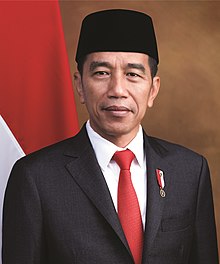In a recent address marking the 22nd anniversary of the National Movement Against Money Laundering and Terrorism Financing, President Joko Widodo (Jokowi) underscored the imperative for Indonesia to remain vigilant against evolving money laundering methods, particularly those leveraging advancements in technology, including the cryptocurrency market.
According to President Jokowi, the rise of new technology-based money laundering techniques poses a significant challenge, necessitating continuous monitoring of cryptocurrency assets, NFTs, electronic money, and artificial intelligence. Citing a report, he revealed that the global value of assets laundered through crypto markets had surged to a staggering US$8.6 billion in 2022, highlighting the scale of the threat.
To effectively combat this menace, President Jokowi urged relevant ministries and agencies to adopt a multifaceted approach. This includes bolstering international cooperation, enhancing regulatory frameworks, ensuring transparent and equitable law enforcement, and harnessing technological advancements. Emphasizing the importance of staying ahead of money launderers, he cautioned against complacency, urging swift and decisive action to thwart their illicit activities.
Moreover, President Jokowi stressed the importance of remaining vigilant against terror financing, recognizing it as another pressing concern that demands concerted efforts from all stakeholders. In this regard, he called for heightened cooperation and coordination among ministries and agencies to prevent the misuse of financial resources for nefarious purposes.
Asset Forfeiture Bill
President Jokowi Widodo, commonly known as Jokowi, has spotlighted the significance of the forthcoming Asset Forfeiture Bill in a bold move to combat money laundering. Anticipated to be ratified by the House of Representatives (DPR), this legislative measure aims to fortify Indonesia’s legal framework, enabling swift punishment for money launderers while facilitating the recovery of ill-gotten state assets.
Money laundering poses a significant threat to Indonesia’s economic stability and integrity. Proceeds from illicit activities, such as drug trafficking, corruption, and terrorism, are often laundered through intricate financial transactions, concealing their illicit origins and legitimizing them in the formal economy. This not only undermines the country’s financial system but also hampers efforts to combat crime and uphold the rule of law.
President Jokowi’s endorsement of the Asset Forfeiture Bill underscores the government’s unwavering commitment to tackling this pervasive issue. The legislation seeks to dismantle money laundering networks, disrupt illicit financial flows, and deter would-be perpetrators by providing law enforcement agencies with enhanced tools and authority.
Key provisions of the Asset Forfeiture Bill include streamlined procedures for seizing assets acquired through illegal means, expanded investigative powers for authorities, and stricter penalties for offenders. These measures are designed to expedite the confiscation of ill-gotten gains, ensuring that criminals are deprived of the fruits of their illicit activities.
Furthermore, the bill empowers the Indonesian government to repatriate stolen assets stashed abroad, bolstering international cooperation in the fight against financial crimes. By recovering state assets siphoned off through corruption and other unlawful practices, Indonesia aims to replenish its coffers and reinvest in public services and infrastructure for the benefit of its citizens.
Optimism of President Jokowi
President Jokowi’s optimism regarding the bill’s potential reflects a broader consensus among policymakers, law enforcement agencies, and civil society stakeholders. Recognizing the urgency of addressing money laundering, stakeholders have rallied behind the initiative, advocating for its swift enactment to safeguard Indonesia’s financial integrity and uphold the principles of accountability and transparency.
In addition to legislative reforms, Indonesia is also enhancing its institutional capacity to combat money laundering and related offences. The Financial Transaction Reports and Analysis Center (PPATK), the country’s financial intelligence unit, plays a pivotal role in detecting suspicious transactions, analyzing financial data, and providing actionable intelligence to law enforcement agencies.
Furthermore, Indonesia is actively engaging with international partners, including the Financial Action Task Force (FATF), to strengthen its anti-money laundering regime and align its practices with global standards. By demonstrating its commitment to combating financial crimes, Indonesia seeks to enhance its reputation as a responsible member of the international community and promote investment and economic growth.
In conclusion, the upcoming Asset Forfeiture Bill represents a significant milestone in Indonesia’s efforts to combat money laundering and uphold the rule of law. With President Jokowi’s steadfast support and bipartisan backing, the legislation is poised to become a cornerstone of the country’s anti-money laundering framework, sending a clear message to criminals that their illicit activities will not go unpunished. As Indonesia moves forward with its legislative agenda, the international community will be closely watching its progress, eager to see how these measures will contribute to a safer, more secure, and prosperous future for all Indonesians.


